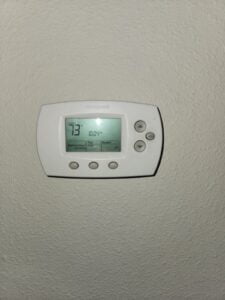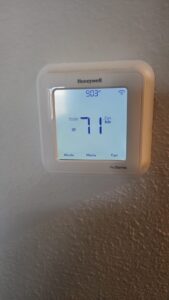3 Surprising Benefits of Turning Off Your AC When Out
Navigating the balance between comfort, cost, and energy efficiency in home cooling is a common challenge for homeowners. A pivotal question in this balancing act is whether to turn off the air conditioning (AC) when leaving the house. This blog delves into the pros and cons, offering insights to help you make informed decisions.
Understanding AC and Energy Use
Air conditioning (AC) systems are essential for maintaining comfort in homes and workplaces, especially in regions with extreme temperatures. However, they are also among the highest consumers of energy in residential and commercial settings. Understanding how AC systems work and their energy use is crucial for optimizing their efficiency and reducing their impact on both your wallet and the environment.
How AC Works
AC systems function by removing heat and humidity from indoor air. The process involves a refrigeration cycle, where a refrigerant absorbs heat from the indoor air and releases it outside, thus cooling the air inside the building. The main components of an AC system include the compressor, condenser, expansion valve, and evaporator coil.
- Evaporator Coil: Located inside the house, it cools the air as the refrigerant evaporates and absorbs heat.
- Compressor: Increases the pressure of the refrigerant, preparing it for heat release.
- Condenser Coil: Located outside, it releases the absorbed heat into the outdoor air.
- Expansion Valve: Regulates the flow of refrigerant into the evaporator coil.
This cycle repeats continuously to maintain the desired indoor temperature.
Energy Consumption
AC systems are intensive energy users due to the power required to run the compressor and other components. The energy consumption of an AC unit depends on several factors, including its size, efficiency rating (such as SEER – Seasonal Energy Efficiency Ratio in the US), the outdoor temperature, and how well the building is insulated.
- SEER Rating: The efficiency of air conditioners is often measured by the SEER rating, with higher numbers indicating more efficient units. Investing in a high-efficiency AC can lead to significant energy savings over time.
- Size: Proper sizing of an AC unit is crucial. An oversized unit can lead to inefficient cycling, while an undersized unit may run continuously, struggling to cool the space effectively.
- Insulation: The insulation quality of a building affects how well it retains cool air. Better insulation means less work for the AC, leading to lower energy consumption.
- Usage Patterns: How and when you use your AC also impacts its energy consumption. Setting the thermostat to a higher temperature when you’re not home or at night can reduce energy use.
Reducing Energy Consumption
Improving the energy efficiency of your AC involves several strategies, including regular maintenance (such as cleaning filters and servicing), upgrading to a more efficient model, and optimizing the use of your thermostat. Additionally, enhancing the insulation and airtightness of your home can significantly reduce the workload on your AC system, thereby saving energy.
- Regular Maintenance: Ensuring your AC system is regularly serviced and the air filters are clean helps maintain its efficiency.
- Thermostat Settings: Using programmable thermostats to adjust the temperature based on your schedule can lead to substantial energy savings.
- Upgrades: If your AC unit is old, upgrading to a more energy-efficient model can reduce your energy consumption and costs.
- Home Improvements: Investing in better insulation, sealing leaks, and installing energy-efficient windows can help keep your home cooler without relying as heavily on AC.
The Debate: To Turn Off or Not?
The decision to turn off the air conditioning (AC) when leaving the house sparks considerable debate among homeowners, energy experts, and environmental advocates. This discussion centers around balancing comfort, energy consumption, and cost efficiency. Let’s delve into the pros and cons of both approaches to provide a clearer perspective on this issue.
Leaving the AC On
Pros:
- Maintains Comfort: Keeping the AC on ensures you return to a comfortably cool home without waiting for it to cool down.
- Protects Home Environment: Consistent temperatures help protect sensitive electronics, indoor plants, and pets from extreme heat.
- Efficiency for Short Absences: For short durations, it may be more efficient to leave the AC on but set at a higher temperature, as the energy required to maintain a slightly cooler temperature can be less than cooling a significantly heated home.
Cons:
- Increased Energy Bills: Continuous operation leads to higher energy consumption, reflecting directly on your utility bills.
- Wear and Tear: Constant use can accelerate wear on the AC system, potentially leading to more frequent repairs or a shorter lifespan.
- Environmental Impact: Higher energy usage contributes to greater carbon emissions, affecting environmental sustainability.
Turning the AC Off
Pros:
- Significant Savings: Turning off the AC when leaving can lead to substantial reductions in energy bills, as you’re not cooling an empty house.
- Reduced Environmental Footprint: Lower energy consumption means less demand on power plants, which can lead to reduced greenhouse gas emissions.
- Extended AC Lifespan: Less operational time can extend the lifespan of your AC system by reducing overall wear and tear.
Cons:
- Initial Discomfort: Returning to a hot house can be uncomfortable, requiring a period of adjustment as the AC cools the home back down.
- Moisture and Mold Growth: In very humid climates, turning off the AC can lead to increased indoor humidity levels, potentially fostering mold and mildew growth.
- The strain on the System: Re-cooling a significantly heated home can put additional strain on the AC, especially during heatwaves, potentially offsetting some of the savings from turning it off.
Factors to Consider
- Duration of Absence: The decision often hinges on how long you’ll be away. For short periods, adjusting the thermostat might be more beneficial, whereas for extended absences, turning the AC off could lead to greater savings.
- Climate and Weather: In areas with extreme heat and humidity, leaving the AC on at a higher setting may prevent heat-related damage to the home’s interior and improve comfort upon return.
- Type of AC System and Home Efficiency: Modern, high-efficiency systems and well-insulated homes may reduce the drawbacks of both turning the AC off and leaving it on.
Considerations Before Turning Off Your AC
Before deciding on turning off your air conditioning (AC) unit when leaving your house, there are several important considerations to weigh. These factors can significantly impact not just your comfort but also the efficiency and longevity of your AC system. Here’s a detailed look at what to consider before turning off your AC:
1. Duration of Absence
The length of time you’ll be away from your home plays a crucial role in deciding whether turning off your AC is beneficial. For short absences, such as a few hours, turning off your AC might not yield significant energy savings and could lead to discomfort upon return. However, for longer periods, like a day or more, turning off your AC can lead to substantial energy savings.
2. Indoor Humidity Levels
High humidity levels can be a concern, especially in certain climates. Turning off your AC can lead to increased indoor humidity, which can promote the growth of mold and mildew. If your area is prone to high humidity, it’s important to consider the potential impact on your home’s air quality and structural integrity before turning off your AC.
3. Home Insulation and Sealing
The quality of your home’s insulation and sealing affects how well it retains cool air. Homes with better insulation and tight sealing maintain comfortable temperatures for longer, even after the AC is turned off. Before deciding to turn off your AC, assess your home’s insulation quality and consider any improvements that could enhance its energy efficiency.
4. Impact on Pets and Plants
If you have pets or indoor plants, their needs should be taken into account. Turning off your AC could result in temperatures that are uncomfortably high for pets or could affect the health of certain plants. Evaluate the comfort and safety of your pets and the needs of your plants before turning off your AC.
5. Energy Efficiency of Your AC System
The energy efficiency of your AC system can influence your decision. More efficient systems tend to cool homes more effectively and might not need to run as frequently to maintain a comfortable temperature. If your system is older or less efficient, turning it off might lead to greater energy savings, but also a longer cooldown period when you return.
6. Use of Programmable or Smart Thermostats
Programmable or smart thermostats can offer a middle ground by allowing you to increase the temperature setting rather than completely turning off your AC. These devices can be programmed to adjust the temperature based on your schedule, reducing energy usage without fully turning off the system and still maintaining a relatively comfortable indoor environment.
7. Re-cooling Time
Consider how long it will take to cool your home back down to a comfortable temperature upon your return. In some cases, the energy required to re-cool a significantly heated home might offset the savings achieved by turning off the AC, especially if your system is less efficient or your home lacks proper insulation.
Strategies for Turning Off Your AC
Adopting strategies for turning off your air conditioning (AC) system efficiently can help you balance energy savings with maintaining a comfortable and healthy home environment. Here are several strategies to consider when you decide to turn off your AC, ensuring you maximize benefits while minimizing any potential drawbacks.
1. Use Programmable or Smart Thermostats
One of the most effective strategies for managing, when to turn off your AC, is through the use of programmable or smart thermostats. These devices allow you to set your AC to turn off automatically at times when you’re usually out of the house and to turn back on or adjust to a more comfortable temperature shortly before you return. This ensures energy savings without sacrificing comfort upon your return.
- Programmable Thermostats: Let you set schedules for different times and days of the week.
- Smart Thermostats: Offer more flexibility, including remote control via smartphone apps, learning your preferences over time, and adjusting settings for optimal energy savings and comfort.
2. Gradual Temperature Adjustments
If you’re hesitant about completely turning off your AC, consider gradually increasing the thermostat setting instead. Adjusting the temperature to be a few degrees higher when you’re away can still result in significant energy savings. For example, setting the thermostat to 78°F (26°C) instead of 72°F (22°C) when you’re not home can reduce energy consumption.
3. Improve Home Insulation and Sealing
Enhancing your home’s insulation and sealing leaks can make turning off your AC more efficient. Better insulation helps maintain your home’s temperature for a longer period, reducing the need for continuous AC operation. Focus on areas such as windows, doors, and attic spaces to ensure they are well-sealed and insulated.
4. Utilize Natural Ventilation
On cooler days or during cooler parts of the day, such as early morning or late evening, consider turning off your AC and opening windows to promote natural ventilation. This can help keep your home comfortable without the need for AC, saving energy and providing fresh air circulation.
5. Employ Ceiling Fans and Other Cooling Methods
Using ceiling fans, portable fans, or evaporative coolers can help circulate air and make indoor spaces feel cooler without the need for AC. While these methods consume energy, they are generally more energy-efficient than running an AC system. Remember to turn off fans in unoccupied rooms, as fans cool people, not spaces.
6. Shade and Reflect Heat
Implementing external shading solutions, such as awnings, blinds, or shade trees, can reduce heat gain through windows and decrease the need for AC. Interior reflective window films can also help by reflecting heat away from your indoor spaces.
7. Consider the Heat Load from Appliances
Minimize the use of heat-generating appliances during the hottest parts of the day. This includes ovens, stovetops, and dryers. By reducing the internal heat load, you can make turning off your AC more practical, as less heat will accumulate inside the house.
Turning Off or Not Your AC: Making the Decision
Deciding whether to turn off your AC when leaving the house is not a one-size-fits-all situation. It requires balancing energy savings with comfort, the specific characteristics of your home, and the efficiency of your AC system. By considering the duration of your absence, your home’s insulation, the local climate, and employing technology like smart thermostats, you can make a decision that saves energy without sacrificing comfort. Remember, each household will have different needs and priorities, making it important to weigh these factors according to your unique situation.
Efficiency Unlocked: Mastering the Art of Turning Off Your AC with The AC Therapist’s Expertise
In the ongoing quest for optimal home comfort and energy efficiency, one question frequently emerges at the forefront of homeowners’ minds: Should you consider turning off your AC when leaving the house? This seemingly simple action, turning off the AC, holds the potential for significant energy savings and environmental benefits, yet it also raises concerns about comfort and the well-being of your indoor environment. At The AC Therapist, we understand the complexity of this decision and are committed to providing you with all the necessary insights and guidance to navigate this choice confidently.
Turning off your AC when you step out can be a smart strategy for reducing energy consumption and lowering your utility bills. However, the decision to turn off the AC should be made after considering various factors, such as the length of your absence, the characteristics of your home, and the specific needs of your household. Turning off the AC for short periods might not always offer substantial savings, but for longer absences, it could lead to noticeable reductions in energy use. The act of turning off your AC, therefore, requires thoughtful consideration to ensure it aligns with your goals for energy efficiency and comfort.
At The AC Therapist, we emphasize the importance of turning off your AC wisely. Turning off your AC should not compromise the comfort of your return home. For this reason, we advocate for the use of programmable or smart thermostats, which can automate the process of turning off your AC, ensuring that your home remains at a comfortable temperature when you return. These innovative tools allow for the precise control of your home’s climate, making the process of turning off your AC both convenient and efficient.
Furthermore, turning off your AC should be part of a broader strategy for maintaining an energy-efficient home. This includes enhancing your home’s insulation, ensuring proper sealing of windows and doors, and considering the installation of energy-efficient window treatments. Such measures can significantly improve your home’s ability to maintain a comfortable temperature, even when you’ve decided to turn off your AC while away.
The AC Therapist is dedicated to helping you make informed decisions about turning off your AC and optimizing your home’s energy usage. Whether you’re contemplating turning off your AC for the first time or seeking ways to improve your existing energy-saving practices, our team of experts is here to provide personalized advice and professional services. From routine maintenance to ensure your AC runs efficiently when needed, to upgrades and installations of smart thermostats, we are your trusted partner in achieving the perfect balance between comfort and efficiency.
In conclusion, the decision to turn off your AC when leaving your house is more than just a question of energy savings; it’s about making a conscious choice to live more sustainably without sacrificing the comfort and quality of your indoor environment.
With The AC Therapist by your side, turning off your AC becomes a calculated decision that contributes to your home’s efficiency and your peace of mind. We encourage homeowners to embrace the practice of turning off their AC when appropriate, armed with the knowledge and support to do so effectively. Let us guide you through the intricacies of turning off your AC, ensuring you make the most of this simple yet impactful action. Together, we can unlock the full potential of your home’s energy efficiency, one step at a time, starting with the wise management of turning off your AC.












